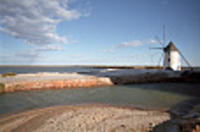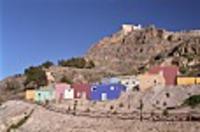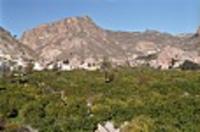So, whilst Murcia’s weather is usually some of the best in Europe, there are times when going for a swim in the sea is definitely out.

Murcia is blessed with fantastic countryside and one of the best ways to get out to places, that you would otherwise only wonder about as you drive by on the motorway, is a new pursuit called ‘geocaching’. Geocaching came about when gadget freaks wanted an excuse to go out and buy the, then, newfangled latest gizmo, a handheld GPS receiver. On 1st May 2000, the U.S. government switched their satellites on to a new, higher accuracy service for civilians. What this meant was that those hand-held GPS gadgets could now place themselves on the earth to within a dozen metres or so of accuracy. Great. Now what? Nice for surveyors, great for shipping and aviation, but what’s the hobbyist going to do with the gadget? Geocaching, that’s what!
Geocaching is, basically, hiding things in interesting places around the globe and publishing your stash or ‘cache’ on a web site: www.geocaching.com . On this web site, which is free to browse and join up as a member (membership necessary to publish a cache), you can search for all caches near a town, near your home, in a country, etc. It’s great fun for families, especially, since it gets everybody outdoors and it’s educational too (mapping, nature, etc.)
Murcia has about a dozen caches at the moment, and that number is rising quickly. They are mostly in places of great natural beauty, perhaps with sea views or really off the beaten track. There are caches near Cartagena, near Murcia, Mazarrón and even way off in the mountains on the Almería border.

So this is a really expensive hobby, right? Not really, the GPS receivers can now cost as little as a good pair of hiking boots. Of course, as with all gadgets, you can spend more (up to €500 for an all-singing, all-dancing, colour display model with built-in maps, electronic compass and barometric altimeter (gadget freaks can stop drooling now)). Garmin and Magellen are the makes to look for when shopping. The other things you will need are those that every sensible hiker owns anyway: good boots with ankle support, water bottles, a map pocket and a mobile phone in case of emergencies. A camera, spare pen and a gonk will help, too. I’ll explain why later.
For each published cache there will be, at a minimum, coordinates of the cache that you can punch into the GPS receiver to use as your guide to the hidden treasure. There will usually be a general description of the area, what kind of things were originally stored in the cache and usually some clues on how to get to the cache, such as where to park and marked footpaths to follow. Often the cache listing includes a ‘spoiler’ which spells out exactly how to find the cache, but needs to be deciphered by hand so you don’t spoil your fun unless you really want to give up looking.

Remember that the GPS receivers are great, but not perfect. You will get very close to the spot with the help of the gizmo, but the next fun part is grubbing around under rocks and around trees to find the cache itself, which is usually hidden away from prying eyes. When you get to the cache, you will often find a Tupperware or metal container (usually an old army-surplus ammo box), which is clearly marked as being a geocache. Inside you will find a log book where you can make a note of your visit (remember the pen?) and some knickknacks. The protocol is to swap knickknacks (remember the gonk?) and take a photo of you on your visit (remember the camera?). When you are done, seal up and hide the cache back as you found it. When you get back to the house, you can record your visit to the cache, describing your experience, giving some hints or tips for future visitors, and even upload that photo you took while you were there!
We look forward to you visiting our caches and us finding yours!
Marcus (gadget freak) and Debbie Jenkins
Buy “A Brit's Scrapbook: Going Native In Murcia”.

